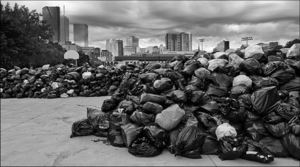Until someone proves that sorting trash into recyclables and compostables actually helps my family, my community, or society at large, I am no longer doing it. You heard right. I’m bringing back garbage!
Remember when it wasn’t an indictable offence to throw things away? Trash all went into a bin and the garbage man took it all away to the landfill. Why did this stop? Has anyone done a cost/benefit analysis on the various forms of recycling and composting we’re forced to adhere to?
 The City of Ottawa spent $8 million last year to collect 55,000 tonnes of organic waste in its green-bin program. This might seem like a substantial amount of compost material to keep out of the landfill, but the fact is that after some rather messy handling it will yield just 18,000 tonnes of actual compost which contains a miniscule amount of usable nitrogen fertilizer that the city could have purchased for less than $7,000. See what I mean? The numbers don’t even come close to adding up.
The City of Ottawa spent $8 million last year to collect 55,000 tonnes of organic waste in its green-bin program. This might seem like a substantial amount of compost material to keep out of the landfill, but the fact is that after some rather messy handling it will yield just 18,000 tonnes of actual compost which contains a miniscule amount of usable nitrogen fertilizer that the city could have purchased for less than $7,000. See what I mean? The numbers don’t even come close to adding up.
Besides, guess what? All this organic waste will decompose in a landfill. Our mountains of trash are constantly shrinking all on their own.
Recycling empty bottles used to make sense. But recycling facilities have become disgusting, festering places. Recycling aluminum cans might make sense. I say “might!” What I’d like is for someone to prove that to me. Anyone?
And please, spare me all the Mother Earth garbage. Unless something makes economic sense there’s a good chance it’s harder on the environment.
The steel industry decided to recycle metal all on its own without any government involvement. It pays to crush cars because there’s so much weight. So, by that same token, it probably makes sense to continue recycling aluminum.
But can someone please tell me why we’re recycling plastic? A barrel of oil is cheap. Think how many pop bottles and plastic bags you’d have to recycle to equal just a single barrel of oil. Until someone proves it’s cheaper to recycle plastic – and no one’s ever bothered to even try − let’s forget about it.
Mother Nature buried quintillions of tons of ancient forests to create the oil fields we tap into today. So why worry about burying a few million plastic bags and bottles every year? All the recycled plastic in the world won’t amount to so much as a drop in the bucket compared to what’s trapped below the earth’s surface.
Oh sure, I can already hear someone chiming in about the piles of plastic floating in the oceans. But take a guess at what caused that problem: recycling! And you heard it here first.
As long as plastic bags, bottles and old toys go straight into a landfill where they’re buried and crushed under the weight of more garbage and dirt, there’s little likelihood they’ll make their way to the ocean. It’s the vain attempt to recycle plastic − an essentially worthless material that has a tendency to escape when transported and stored outdoors − that results in plastic finding its way into the world’s waterways.
Then there’s paper. Like the steel industry, the paper industry long ago decided there was economic value in recycling paper, but only in large quantities. Very large. And have you had a look at all the beetle-kill across the west? You know... the thousands of acres of forests that Greenpeace wouldn’t let us cut down? Better to have cut those trees down for pulp, used them a few times for paper, and then safely disposed of them in landfills. Instead they pose a massive fire hazard across British Columbia.
So please... stop recycling! Save the oceans, the forests and the world. Most of all, save your time and tax money. Just throw your garbage where it belongs, in the garbage.
